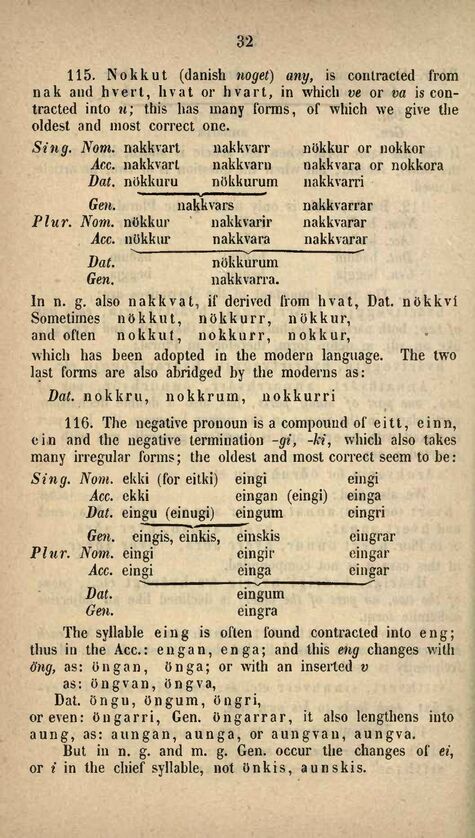
Full resolution (JPEG) - On this page / på denna sida - Part I - Inflection of Words - III. Pronouns

<< prev. page << föreg. sida << >> nästa sida >> next page >>
Below is the raw OCR text
from the above scanned image.
Do you see an error? Proofread the page now!
Här nedan syns maskintolkade texten från faksimilbilden ovan.
Ser du något fel? Korrekturläs sidan nu!
This page has been proofread at least once.
(diff)
(history)
Denna sida har korrekturlästs minst en gång.
(skillnad)
(historik)
115. Nokkut (danish noget) any, is contracted from
nak and hvert, hvat or hvart, in which ve or va is
contracted into u; this has many forms, of which we give the
oldest and most correct one.
| Sing. | Nom. | nakkvart | nakkvarr | nökkur or nokkor |
| Acc. | nakkvart | nakkvarn | nakkvara or nokkora | |
| Dat. | nökkuru | nökkurum | nakkvarri | |
| ⏟ | ||||
| Gen. | nakkvars | nakkvarrar | ||
| Plur. | Nom. | nökkur | nakkvarir | nakkvarar |
| Acc. | nökkur | nakkvara | nakkvarar | |
| ⏟ | ||||
| Dat. | nökkurum | |||
| Gen. | nakkvarra. | |||
| Sing. | Nom. | ekki (for eitki) | eingi | eingi |
| Acc. | ekki | eingan (eingi) | einga | |
| Dat. | eingu (einugi) | eingum | eingri | |
| ⏟ | ||||
| Gen. | eingis, einkis, einskis | eingrar | ||
| Plur. | Nom. | eingi | eingir | eingar |
| Acc. | eingi | einga | eingar | |
| ⏟ | ||||
| Dat. | eingum | |||
| Gen. | eingra | |||
<< prev. page << föreg. sida << >> nästa sida >> next page >>